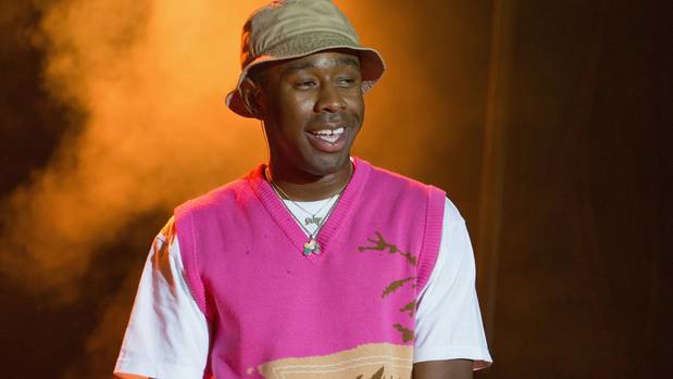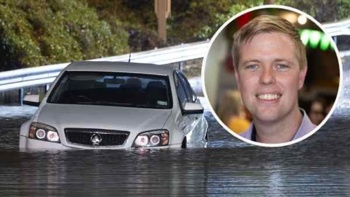
It wasn't an easy road for Bay Dreams organisers, Audio Touring director Mitch Lowe and promoter Pato Alvarez, to get Tyler, the Creator on to New Zealand shores.
Tyler, the Creator, who was born Tyler Okonma, is headlining the festival in Tauranga tomorrow and in Nelson on January 5.
Alvarez said it had been "years in the making", after they originally wanted Okonma to headline the festival in 2019. "We couldn't get it done in time for that year - we had to let it go."
The issue Alvarez speaks of is Okonma's visa after he and his rap group Odd Future were banned from entering New Zealand to perform in February 2014 at the Rapture festival in Auckland.
It was less than six months after the Roast Busters saga had come to light - a case that grabbed national headlines when young men boasted of sexual activity involving underage and drunk girls. Odd Future were seen by Immigration officials as a group with a clear history of "inciting and promoting hatred".
Anti-sex abuse group Stop Demand was a key figure in the group's ban - becoming vocal on comparisons of sex culture similar Odd Future's lyrics and the Roast Busters.
At the time, Stop Demand originally targeted Auckland Council for letting the group perform at the event held at Western Springs, a council-operated property. Founder Denise Ritchie said it was "astonishing" Auckland Council was letting "a group that glorifies rape and rape culture" to perform … at an 'all ages' event".
Stop Demand's movement gained traction, and Immigration stepped in on February 12, 2014.
Documents released under the Official Information Act show Immigration officials viewed Odd Future's lyrics as homophobic and racist. They also said the group glorifies "rape and murder fantasies, as well as cannibalism and necrophilia".
However, Border Operations manager Karen Urwin clarified in an email that it wasn't lyrics that got the group banned but "their history of deliberately inciting violence".
The single incident specified in the documents notes that a police officer was hospitalised following a riot blamed on Odd Future in May 2011.
The 2014 ban happened in less than two days.
It was all go once efforts were made to ban the group. One email from an official says "hopefully they [Odd Future] are not here already".
Their scheduled arrival was clarified and Urwin instructed staff to "hunt down these characters and off load them".
Odd Future were scheduled to arrive in New Zealand at 8am on February 14. The decision was made in an email at 11.34am the day before. Officials were instructed to tell Stop Demand less than three hours later.
Urwin expected the move to "undoubtedly" gain media interested in "shades of Mike Tyson". This is a reference to a Tyson being banned from entering the country because of arape conviction even though he had been grated a visa.
Urwin also saw it as an opportunity to "spin this into a good news story" for Immigration.
An Immigration official responded saying: "Fun times. I think you're right, this is a good story".
Interestingly, Odd Future member Earl Sweatshirt had already performed in New Zealand just weeks beforehand at Laneway festival. Sweatshirt is scheduled to play at Laneway again this year.
Okonma later referenced his ban in a 2015 track, Smucker: "I got banned from New Zealand, whitey called me demon / And a terrorist, God dammit I couldn't believe it / Ban a kid from the country, I never fall, never timber".
Now, nearly six years later, Okonma is returning, visa and all.
His 2014 ban meant his case had to be completely reviewed, which ultimately produced an eerily reminiscent timeline.
Alvarez and Lowe originally had a July 10 date in mind to release this years' lineup, but on July 8 they said "they needed another week or so to get everything ready" because they'd just locked in another headline act. Immigration still hadn't issued Okonma his visa.
On July 30, they announced the lineup would be released on August 2, 2019. Immigration still hadn't cleared Okonma.
He was eventually announced as the headline act at 8am on August 2. But documents from that week show it wasn't until an email 12.26pm on July 31 - less than two days before the announcement - that Immigration cleared Tyler.
In an email to staff who worked on the Okonma case, Immigration manager Michael Carley said, "we need to ensure Mr Okonma and his representative are advised of the decision before any media outlets … it is a courtesy to him".
No one outside of Immigration, Bay Dreams, Okonma or his representative were told for another day.
Lowe said it was so difficult getting Okonma into the country it was a surprise the visa was approved. "That's what made it all so exciting."
He said it took a large team, including major figures of global companies, such as the chief executive of Sony. "Everyone had to club together to get this approved," Lowe said.
"We knew that if we could get him in, we knew it would have a massive impact."
Alvarez said there wasn't a real backup plan in place if Okonma was denied entry again - especially as the other headline act, pop songstress Halsey, is only performing at the Tauranga event.
Lowe said Okonma's ban from the UK lifting provided a snowball effect around the world.
He also said there's a historical trend of artists being granted visas first in Australia and then New Zealand. "Once Tyler had his Australian visa, we felt we were good to go."
"He's not the person he was seven or eight years ago, people recognise that.
"Now he's a very credible artist."
When Okonma was announced as the headline act, Immigration NZ manager Michael Carley told Newstalk ZB Immigration was satisfied the rapper was no longer a potential threat to public order and the public interest.
However, the same can't be said for Ritchie and Stop Demand. She is not happy that Okonma is performing here but she accepts Immigration's decision.
"If this man has changed and grown up, fantastic. If his lyrics no longer glorify rape, that's excellent. And if he's gained some respect for women, then that's all positive news."
She said there's a marked change in Okonma's Grammy-nominated 2019 album Igor. "There's no reference to brutalising, raping and butchering women."
Igor explores the relationship of a man dating another man, who is still in love with his ex-girlfriend.
Ritchie's primary concern now is Okonma commonly referring to women as 'bitch', but she also puts that down to being part of rap culture overall. "If that's the norm … that's a sad reflection. We have to realise violence doesn't take place in a vacuum."
For Ritchie, she doesn't want Okonma's fans to think this behaviour can be normalised and be accepted in everyday life. She said people need to recognise how they can be blindly influenced by pop culture. "But certainly that's not enough to stop someone coming into the country."
Okonma's representative has been contacted for comment.
Take your Radio, Podcasts and Music with you









